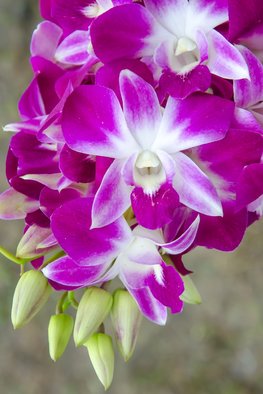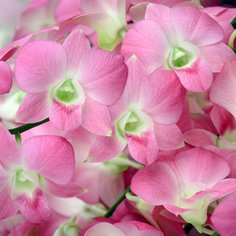Dendrobiums at a Glance
Temperature: 70° – 90° F days, 45° – 65° F nights
Water: Keep almost moist, drier in winter
Light: 25 – 50% shade, brighter in winter
Humidity: 50 – 75%
Food: Twice a month, less in winter
The Dendrobium genus is one of the largest families of orchids with somewhere around 1,000 documented species. Such a large family creates much diversity. There are some Dendrobiums that are very large as well as some miniatures.

Origination
Some Dendrobiums come from warm sea-level conditions of the equatorial Pacific islands while in the near alpine climate of the Himalayan foothills. Dendrobiums are found only in the Eastern Hemisphere – from Australia, throughout the South Pacific and Philippines, Southeast Asia, and India, with a small representation in Japan.
Flowers
Although the color range is varied, most hybrids offered for sale are usually lavender, white, golden-yellow, or combinations of these colors. Some of the more unusual species and hybrids can be bluish, ivory colored, brilliant orange or scarlet, or have exotic markings. Most of the evergreen Dendrobiums are not fragrant, however the deciduous species can have fresh citrus scent or smell of raspberries.
Some Dendrobiums come from warm sea-level conditions of the equatorial Pacific islands while in the near alpine climate of the Himalayan foothills. Dendrobiums are found only in the Eastern Hemisphere – from Australia, throughout the South Pacific and Philippines, Southeast Asia, and India, with a small representation in Japan.
Flowers
Although the color range is varied, most hybrids offered for sale are usually lavender, white, golden-yellow, or combinations of these colors. Some of the more unusual species and hybrids can be bluish, ivory colored, brilliant orange or scarlet, or have exotic markings. Most of the evergreen Dendrobiums are not fragrant, however the deciduous species can have fresh citrus scent or smell of raspberries.

Climate & Light Requirements
Most Dendrobiums that you will commonly find for sale require intermediate temperatures and bright filtered light during the growing season. Humidity should be between 50 and 75%. The easy-growing evergreen Dendrobiums and the Phalaenopsis-like ones can receive this same culture throughout the year. These Dendrobiums produce sprays of long lasting round Phalaenopsis-like flowers that can last for several weeks. They can often bloom several times a year and the flower sprays make excellent cut flowers for arrangements.
Watering & Feeding Requirements
Certain species of Dendrobium (superbum, pierardii, parishii, etc.) are deciduous, that is, they lose their leaves and require cool dry conditions throughout most of the winter. They should be watered only enough to prevent the canes from excessive shriveling and plant food should be withheld completely. During spring and summer these orchids should be provided with ample water and a fertilizer designed specifically for orchids such as Better-Gro® Orchid Plus® plant food, which includes essential minor elements – and NO urea nitrogen – making all elements readily available to your orchids.
Most Dendrobiums that you will commonly find for sale require intermediate temperatures and bright filtered light during the growing season. Humidity should be between 50 and 75%. The easy-growing evergreen Dendrobiums and the Phalaenopsis-like ones can receive this same culture throughout the year. These Dendrobiums produce sprays of long lasting round Phalaenopsis-like flowers that can last for several weeks. They can often bloom several times a year and the flower sprays make excellent cut flowers for arrangements.
Watering & Feeding Requirements
Certain species of Dendrobium (superbum, pierardii, parishii, etc.) are deciduous, that is, they lose their leaves and require cool dry conditions throughout most of the winter. They should be watered only enough to prevent the canes from excessive shriveling and plant food should be withheld completely. During spring and summer these orchids should be provided with ample water and a fertilizer designed specifically for orchids such as Better-Gro® Orchid Plus® plant food, which includes essential minor elements – and NO urea nitrogen – making all elements readily available to your orchids.

